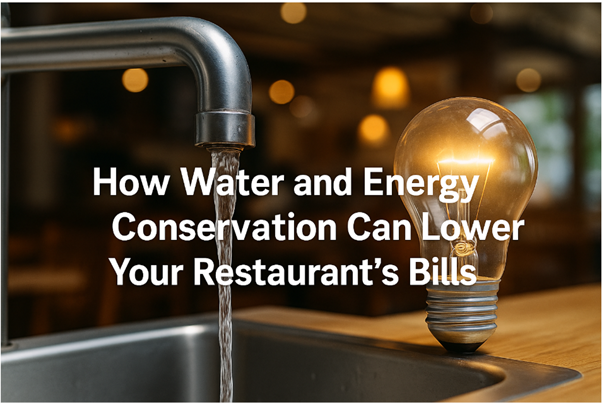
How Water and Energy Conservation Can Lower Your Restaurant’s Bills
Running a successful restaurant isn’t just about crafting delicious dishes or attracting footfall—it’s also about managing resources wisely. Water and energy conservation have emerged as essential strategies for improving your bottom line in a time of rising utility costs and environmental responsibility. Fortunately, restaurants implementing clever conservation tactics reduce costs and win customer trust and support.
Chef Shajahan M Abdul, founder of Restro Consultants Pvt Ltd (RCPL), says, “Resource efficiency is one of the most overlooked profit centers in a restaurant. Saving water and energy is not just sustainable—it’s strategic.”
The Rising Cost of Utilities in Restaurants
Water and electricity consumption in commercial kitchens is significantly higher than in most other businesses. The energy drain is constant- and expensive- from dishwashers and refrigeration units to lighting and HVAC systems.
Chef Abdul says, “Every drop of water and every unit of electricity saved is money back in your pocket. And in today’s economic climate, every rupee counts.”
Many restaurant operators don’t
realise how much waste is happening behind the scenes. That’s where
professional audits from restaurant consultants become invaluable.
How Water Conservation Reduces
Expenses
Water may seem inexpensive, but
leaks, inefficient appliances, and wasteful practices can raise big bills over
time. Here’s how restaurants can conserve water and lower costs:
1. Install Low-Flow Fixtures
Low-flow faucets, pre-rinse
spray valves, and aerators can cut water usage by up to 50%. These upgrades are
affordable and offer quick returns on investment.
Restro Consultants Pvt Ltd
(RCPL) often recommends these tools in water usage audits and has helped
clients in cities like Mumbai and Hyderabad reduce their water bills by 30% or
more.
2. Fix Leaks Immediately
A single dripping faucet can
waste thousands of litres annually, so prompt repairs are essential. According
to Chef Shajahan M Abdul, routine maintenance checks should be part of every
kitchen’s SOP.
3. Upgrade to Water-Efficient
Dishwashers
Modern dishwashers use
significantly less water per cycle than older models. Chef Abdul encourages
restaurant owners to upgrade to Energy Star- certified machines for optimal
savings and efficiency.
How Energy Conservation Adds to
the Bottom Line
Electricity and gas bills are among
restaurants’ most significant monthly expenses. Implementing energy-saving
techniques can drastically cut these costs.
1. Switch to LED Lighting
Replacing incandescent and
halogen bulbs with LEDs can reduce lighting costs by up to 80%. LEDs also emit
less heat, reducing your cooling needs.
RCPL often includes lighting
audits to identify easy energy wins in its consulting services.
2. Maintain Refrigeration Units
Walk-in coolers and freezers use
a large amount of electricity. Keeping them well-sealed, clean, and serviced
reduces strain on the system.
Chef Shajahan M Abdul
emphasizes, “One poorly sealed cooler door can drain your energy budget. Small
details make a big difference.”
3. Use Timers and Smart
Controls
Automated lighting and HVAC
systems can be programmed to operate only when needed. Restaurant consultants
recommend using smart thermostats and motion detectors in storage areas,
bathrooms, and less-used spaces.
4. Opt for Energy-Efficient
Kitchen Equipment
Modern kitchen gear is designed
with conservation in mind, from induction cooktops to high-efficiency ovens.
Though the upfront costs may be higher, long-term savings are undeniable.
Chef Abdul adds,
“Energy-efficient appliances are an investment, not an expense. They pay you
back every single month.”
Financial and Environmental
Benefits
Conserving water and energy lowers
bills and aligns your brand with sustainability, which is increasingly vital to
today’s diners. Many customers actively support businesses that demonstrate
environmental responsibility.
Chef Shajahan M Abdul explains,
“When customers see that you care about the planet, they trust you more.
They’ll support your business—and spread the word.”
Restro Consultants Pvt Ltd
(RCPL) regularly helps restaurants calculate and communicate their
environmental impact reductions as part of branding and marketing strategies.
Steps to Get Started With
Conservation
Ready to start saving? Here’s a
roadmap, as recommended by restaurant consultants at RCPL:
1. Schedule a Utility Audit
Understand where your energy
and water are going. Audits reveal leaks, inefficient equipment, and
unnecessary usage.
Chef Abdul often initiates
audits as part of the operational optimization services provided through RCPL.
2. Train Your Team
Employees should be aware of
the restaurant’s conservation goals. Simple actions—like turning off unused
equipment or reporting leaks—can lead to significant savings over time.
3. Set Measurable Goals
Create monthly or quarterly
targets to reduce consumption. Track performance and celebrate milestones with
your staff.
4. Promote Your Efforts
Let customers know what you’re
doing. Use signage, menu tags, or social media posts to communicate your green
initiatives.
“Transparency turns savings
into storytelling,” says Chef Shajahan M Abdul. “Customers love supporting
restaurants that walk the talk.”
Success Stories from the
Industry
Restaurants across India and
beyond are embracing conservation:
These stories aren’t
exceptions—they’re replicable models with the right systems in place.
Final Thoughts from Chef
Shajahan M Abdul
Water and energy conservation
isn’t just about saving the environment—it’s about running a more intelligent
business. With rising utility costs and customer expectations around
sustainability, restaurants must act fast.
As Chef Abdul puts it:
“Every saved drop and watt adds to your profit. Conservation is not just good
karma—it’s good business.”
With expert guidance from restaurant consultants at Restro Consultants Pvt Ltd (RCPL), your restaurant can implement practical, profitable conservation strategies that benefit both your bottom line and the planet.
Chef Abdul © Copyright 2024. All rights reserved.